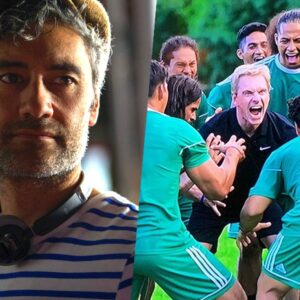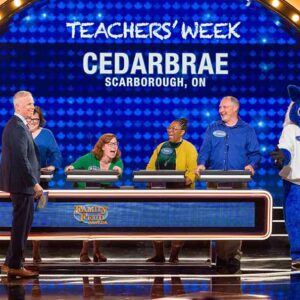
By Liz Hill
Screenwriter Kaherawaks Thompson, St. Regis Mohawk, was chosen as one of just six young Native writers to participate in the Sundance Institute’s inaugural Native Writer’s Workshop held in conjunction with the Institute of American Indian Arts (IAIA) on the IAIA campus on July 15-19 in Santa Fe, New Mexico.
Thompson is a 2010 Sundance Institute Native Fellow whose short script, “Tehokkenhén:tons,” was produced in 2012. Her script submitted for the workshop, “Lefty’s Hymn,” tells the story of a Kanien’kehá:ka fiddler who finds it difficult to refuse an insistent stranger’s too-good-to-be-true offer to play a private outdoor event. Thompson’s script was chosen from a nationwide call for short script submissions.
“During our workshop the screenwriters were paired with professional mentors from the film and television industry in a program designed to enhance their approach to the craft of storytelling as well as to prepare them for the realities of pursuing a career in the entertainment industry,” said Sundance Institute Native American and Indigenous Program Director N. Bird Runningwater, Cheyenne and Mescalero Apache.
Thompson was born and raised in Akwesasne. She attended community college, film school and culinary school, completing a degree in Baking and Pastry Arts from Algonquin College in Ottawa, Ontario. She currently resides in Memphis, Tennessee.
“I was so honored and excited to work with Sundance Institute’s Native Program again,” said Thompson. “The 2010 Fellowship changed my life, truly. Previously, I felt so alone and I just had no idea there were so many talented, passionate and active Native writers and filmmakers out there. It opened up a whole new world for me, and I met some really incredible people. I knew the program had changed since my 2010 Fellowship but I also knew it would be another intense, intimate and productive experience.”
“The common thread is definitely Sundance Institute’s commitment to story and authenticity,” said Thompson. “I would do a hundred workshops with them, if I could!”
“I became a screenwriter out of necessity—I was an avid reader at a young age and wrote my first short story at the age of seven,” said Thompson. “I continued to write short stories into my 20s but never knew what to do with them. I have always really loved movies and reached a point where the written word wasn’t enough on its own anymore—in my mind, I could so clearly see the worlds and characters I had created and realized that film is the most powerful storytelling medium, for me.”
“It really is incredible to see your work come to life; and it’s even more incredible that films have the ability to take on a life of their own, one that you never even knew was on the page,” said Thompson.
“Being Mohawk has influenced my work in many ways,” said Thompson. “I grew up watching John Wayne movies with my aunt and always wondered why the Native characters were so one-dimensional and unlike any Natives I knew in real life. Even as a child, it was clear to me that we need to make our own films, and tell our own stories, in our voices. To be honest, all of my work features Mohawk characters, but the fact that they are Mohawk isn’t the point of the story. They just happen to be Mohawk, like me. It’s important that my characters are all unique and non-stereotypical. Also, I have many relatives who are great orators—I am not. I try to carry on the great oral tradition in my own way, in film.”
The Sundance Institute workshop was intimate and intense with the six writers and mentors sitting around a conference table and discussing their work with one another for several days. “I expected great feedback and honest critiques, which I received, but I was also blown away by the incredible support and camaraderie,” said Thompson. “Sundance Institute workshops are definitely a safe space for writers—it’s okay to be vulnerable and brutally honest.”
“All of the advisers really weren’t afraid to dig deep to understand the writers and our stories, and didn’t shy away from challenging us,” said Thompson. “In film, every scene matters. If you have a scene you love just because it’s flowery or special to you, but doesn’t progress the story, the advisers will call you out on it. The honesty and openness among everyone was truly inspiring.”
“Kaherawaks continues to be dedicated to honing her skills as a screenwriter, which will help provide a solid foundation for her future projects,” said Runningwater. “Her voice is authentic and sincere and we cannot wait to see how her film evolves.”
For the past year, Thompson has been working on her first feature screenplay, which was accepted into imagineNATIVE Festival’s inaugural writing lab in May 2014. “I also have several short film scripts, one of which I worked on at the Sundance Institute/IAIA workshop and will continue to work on, until I have the strongest draft,” said Thompson. “In 2012, the short script that I workshopped as a Sundance Institute Native Fellow in 2010, “Tehokkenhén:tons” (“Close To Death”), became a reality. The film is available through my non-profit distributor in Toronto, Vtape. Vtape has one of the largest collections of Indigenous film and video art from around the world. They are a great resource for Native filmmakers.”
Thompson encourages young Mohawks who are considering a film career to pursue their dreams. “Read screenplays, watch movies, apply for workshops, attend film festivals,” said Thompson. “I had no idea what I was doing when I wrote my first screenplay—it was a muddled mess. I learned the format from reading scripts of movies I was familiar with and from technical screenwriting books. I’m lucky that my story and ideas rose above enough that I was given chances to workshop my material with experienced writers, pretty early on. I highly recommend applying for workshops and fellowships, particularly through Sundance Institute and imagineNATIVE Festival.”
“Always, always apply, for everything and anything,” said Thompson. “Don’t take rejection personally, ever. There are so many fantastic opportunities out there for Indigenous writers and filmmakers, youth especially. People often say to me, “I have good ideas, but I can’t write.” I don’t believe in that. If you are passionate and have stories to tell, work on your craft, your voice will become stronger.”











